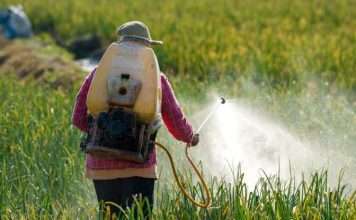Concerns have been raised by experts regarding the misuse of agrochemicals in agriculture, with the quality and safety of food being a significant issue for Nigeria’s large population.
Nutritionists and agriculturalists have highlighted the problem of pesticide residues on farm products, such as fruits and vegetables, which negatively impact the quality and safety of food in the country.
These experts warn that consuming food contaminated with chemical residues, without purifying them, has led to an increase in certain illnesses in Nigeria, including organ failures, cancers, cell disruption, infertility, and neurological problems.
Additionally, it has been observed that while some residues can be easily eliminated or purified, others cannot, leading to the rejection of many Nigerian agricultural products destined for export.
To address this issue, the experts are calling on the Federal Government, specifically the Ministry of Agriculture, to regulate and monitor the use of agrochemicals, especially herbicides that are absorbed and stored in various parts of plants.
The United States National Pesticide Centre confirms that there is no foolproof method of completely purifying chemical residues, emphasizing the need for regulation in chemical usage.
The centre states that washing fruits and vegetables with water alone only removes dirt, germs, and some pesticide residues on the surface.
Furthermore, it has been learned that, in addition to using warm water and salt solution, washing fruits, vegetables, and other produce under running water is also effective.
Ignatius Onimawo, a Professor of Human Nutrition and the Vice-Chancellor of Ave Maria University in Abuja, explained that the ability to purify fruits and vegetables depends on the type of chemicals used.
He suggested that if pest control chemicals are used, they can be washed off using warm water and salt solution. However, if the residues are from herbicides used for weed control, they are more difficult to remove.
Onimawo emphasized that this is why a significant amount of Nigeria’s agricultural produce intended for export is rejected.
He further explained that when pesticides are sprayed on fruits and vegetables, the chemicals do not penetrate deep inside, and washing them with warm water and salt helps eliminate the residues.
The use of warm water and salt aids osmosis, which involves the movement of water molecules from a solution with a higher concentration of water molecules to one with a lower concentration, through the semi-permeable membrane of a cell.
The Nutritionist added, “When the warm water is used, the oozing out water shrinks and kills the bacterial cells and destroys their presence on the vegetables.”
Onimawo emphasized that soaking vegetables in salt water effectively eliminates pesticides, insecticides, bacteria, and bugs that may be present. Failure to remove these contaminants can result in food poisoning and potentially dangerous hospital situations, particularly if the responsible organisms are harmful.
The physician also mentioned the challenging task of clearing pesticide and herbicide residues, underscoring the importance of farmers minimizing their usage on crops.
Onimawo stated, “The one that poses a major challenge is the herbicides used in clearing weeds. Sometimes, when it is used in excess, the roots of the crops pick them up from the soil and store them in the food. This then goes into the body of the product.
“This is why the majority of Nigeria’s farm produce meant for export is rejected because they will always test positive for pesticide residues.
“Farmers have been advised on how to use herbicides. They will first use it to clear weeds before ridges and planting. But when they use it while the plants are still growing, the roots will pick up residues in the soil when it rains.”
Dr. Samuel Nwakonobi, an Agro Engineer and owner of Colearns Chemical, Lagos, expressed concerns about the harmful effects of pesticides. He explained that these chemicals can accumulate in human cell membranes, causing disruption to the body’s functioning. The use of pesticides has resulted in fatalities and complications, particularly for pregnant women and children who are more vulnerable due to their developing organs and metabolism.
Nwakonobi emphasized that the negative health effects from exposure to chemical pesticides can be both short-term and long-term. In the short-term, the liver, kidneys, blood, lungs, neurological system, immunological system, and digestive system can be adversely affected.
However, Nwakonobi also mentioned various methods to reduce chemical residues on fruits and vegetables, such as peeling the produce and using ingredients like baking soda, lemon, and vinegar.
A study titled “Comparison of Different Home Commercial Washing Strategies for Ten Typical Pesticide Residue Removal Effects in Kumquat, Spinach, and Cucumber” by Yangliu Wu et al, published in the National Library of Medicine, supports the idea that excessive pesticide residues can be harmful to consumers.
The study highlights potential effects like neurotoxicity, carcinogenicity, reproduction abnormality, and cell dysplasia. It also suggests that food processing techniques like washing, peeling, blanching, and cooking can help reduce pesticide residues and improve the quality and safety of fruits and vegetables.
